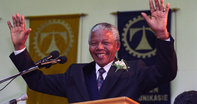
A Standing Ovation
Almost as one, 1 300 people rose from their seats in the Linder Auditorium at the University of the Witwatersrand's education complex in Johannesburg as a grey-haired man dressed in dark clothes limped on to the stage with his wife holding one arm and an aide the other. The applause was spontaneous and loud.
The man was Nelson Mandela and he was about to introduce the speaker at the fifth Nelson Mandela Lecture, the man who 'had run the world' as Secretary-General of the United Nations (UN) for a decade, Kofi Annan.
The largely South African audience reflected the 'rainbow nation' that Mandela ushered into the country on 10 May 1994 at his inauguration as the first black President of a democratic South Africa. The audience turned its attention later to Annan but for the moment it was Mandela they focused on and lauded.
The Mandela Trademark
Mandela, a frail celebrant of his 89th birthday and his 9th wedding anniversary only a few days earlier, acknowledged the applause with what had become his trademark, a generous smile and a wave of the hand.
Throughout the proceedings on Sunday 22 July 2007, the spontaneous acclamation with flashes of adulation lighting the gathering was to occur another three times as Mandela manoeuvred himself to the speaker's platform and then back to his chair and later after Annan had delivered his measured view of Africa when he left the stage.
Artists in the theatre never get four standing ovations in one night — one, maybe two at most — but there were four for an ageing man with a beaming smile. Overkill? Hardly, in a country where this man contributed with consummate skill, great courage coupled with sensitivity and understanding to help achieve a relatively peaceful transfer of power from a tyrannical government to an oppressed majority. The process has been called a miracle.
Nelson Mandela A Man of Reconciliation
South Africa had been on the brink of civil war with the combustible material merely awaiting someone to strike a match to set off a calamitous, destructive conflagration - a spark ready at hand in the grasp of firebrands lurking in the country, fortunately not in large numbers. Then Mandela brought his calming voice and influence to bear.
After a 27-year history of unjust imprisonment and the brutal oppression of his fellow Africans by the government, he could have exercised the power newly bestowed on him to exact revenge on the former rulers. Instead, he chose reconciliation and peaceful coexistence and persuaded others that this course was the only acceptable way forward.
It is true that the transfer of power was achieved with the cooperation of the white leader F.W. de Klerk, but without Nelson Mandela and his spirit of inclusiveness, his striving for peace and his leadership qualities, it would not have happened. Apart from respect for his age and the spirit of reconciliation exuding from him, the audience was also celebrating his dedication to peace and his concern for minorities.
 SouthAfrica.co.za hosted a photo exhibition on the legendary photojournalist Peter Magubane’s 100 best photos of Nelson Mandela, as the wo...
SouthAfrica.co.za hosted a photo exhibition on the legendary photojournalist Peter Magubane’s 100 best photos of Nelson Mandela, as the wo... Nelson Rolihlahla Mandela is a former president of South Africa, the first to be democratically elected after the apartheid system was aboli...
Nelson Rolihlahla Mandela is a former president of South Africa, the first to be democratically elected after the apartheid system was aboli...